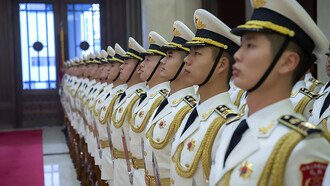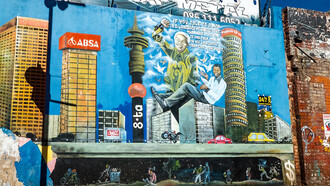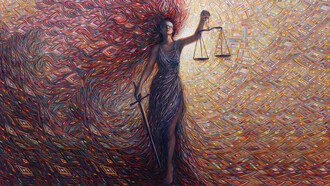We were in a world cut in two, that much was clear to me. On one side, those who oppress and profit from it; on the other, the humiliated, the offended, in short, the victims. I chose very early on which side to be on, that of the victims. But beware! Victims who raise their heads, who stand up, who fight back.
Hend Ben Haj Ali, a 59-year-old Tunisian-Algerian, former editor in a publishing house and a woman theater, now municipal councilor of the Tunis municipality and president of ANACOM, the National Association of Municipal Councilors, has been, a few days ago, physically and verbally assaulted and then imprisoned for a few hours, in violation of her rights, by a representative of the law who was supposed to protect her and enforce the law, while she was exercising her duties as a local elected official. Why? She simply wanted to implement the law against a notorious fraudster, trafficker of all kinds and slum lord at the expense of migrants and refugees, who proclaims himself above the law that he has never stopped violating. The case is already under judicial investigation because the Local Government Code, promulgated in May 2018, does not reserve any 'special' protection for mayors, nor for municipal councilors.
These elected officials, who have the status of public officials, are protected by the Tunisian Criminal Code, insofar as any assault committed against them is qualified as an 'assault against a public official or equivalent'. But what about when the assault is carried out by the person who is supposed to enforce the law and protect elected officials?
Hend has not been silent and will not be silent. For her, this is just another battle against corruption that she has been fighting for years, ultimately through filmed hearing sessions of testimonies from representants of all sectors, from agriculture to customs, from journalists to magistrates, lawyers, teachers to social workers and others, who have worked hard to expose, with evidence, the violations and acts of corruption and injustice perpetrated since 2011 to bring the country to its knees and dismember the structures of the State.
Like a river in flood, Hend speaks with passion and precision. This is her testimony.
A born, free and emancipated leader from an early age, she was involved in left-wing student circles from a very young age and was taken by the hand of Tunisian left-wing leaders from high school, a period during which she helped set up trade union action committees in schools.
Born into a family of left-wing trade unionists, after the loss of her father at a very young age, she was brought up by her Algerian mother, also a child of the Algerian revolution and heir to a family of martyrs, who distributed baskets to the mujahidin against French colonialism from an early age. Hend grew up learning that women and men are equal in duties but also in rights and became passionate about the Palestinian issue, attending the Palestinian Liberation Front, Popular Front and PLO, which were based in Tunisia, and the struggles in Latin America, at the time of the popular uprisings, struggles with a very strong dynamic at the time, which had an impact on the student and working class in Tunisia.
A free electron, unclassifiable, refusing to be put in a mold, a fact that bothers many, because 'she belongs to no one', Hend nevertheless participated in all the struggles of the left, against the injustice that the left suffered in the 1980s, during the Bourguiba era and then that of Ben Ali, from demonstrations to claims, from clashes to communiqués.
Even though she could not understand why, despite having the same goals, there were so many differences and contradictions between these different currents of the left, she stood by them, while remaining free in her movements, ideas and actions, refusing to be assimilated into any ideology that could separate human beings from one another, this very ideology being a creation of human beings, convinced that the true ultimate value is human value, because it is intolerable and unacceptable, for her, to choose ideology and deny the human. Refusing to accept that ideas can separate human beings, she gradually moved away from the traditional battle.
With this spirit she evolved free of any ideological chains, considered by her comrades as indomitable, she found herself, fortuitously and for the happiest of circumstances, in a committed theater company, after meeting the director who later became her husband.
Culture is the only thing that can change the world, not ideology, theater has been a great revelation for me, the stage is the greatest school of life.
Not admitting that ideologies can separate people and firmly believing that only culture can unite, she naturally and fortunately found herself in a theater company, 'El Halaqa' ('The Circle'), where she spent 20 years of her life doing only committed theater.
It was a major turning point in her life, an extraordinary experience, rewarding in all ways and in all regions of the country and the world, under the lights, always solicited, overwhelmed by the applause of a large audience listening, in a dynamic of debate, confrontation and exchange. A star of committed theater, she was able to blossom and make her voice heard, to convey and discuss the social and the political.
Unfortunately, the 2011 popular uprising broke this dynamic, Hend's emotionally charged voice was interrupted, the theater missed her. She was forced to stop everything out of a sense of duty, to devote herself exclusively to defending her country in all areas, to denouncing the orchestrated violations and murders committed by those who have ruled since 2011.
"Tunisia has always been a society run by women since the dawn of time, it was they who held the power, even if, on the surface, it seemed to be in the hands of men but, in reality, it was women who were the protagonists. The Code of Personal Status did nothing but consolidate this state of affairs.
The Code is a great achievement in terms of legislation, which imposed a way of life and behavior in society, breaking with the Zitounians who wanted to impose Islamic law, commonly known as Sharia. Our grandmothers fought for the liberation of Tunisia, carried arms and contributed to the resistance. They were already free by their existence, by their actions. We were never completely subjugated to religion or dogma, even if the laws at the time were unjust.
The Tunisian woman, as a matter of principle, always struggled and asserted herself, the first woman leader from whom Hend drew inspiration, and whose steps she followed, was her mother. For her, the Tunisian woman is Alyssa, Kahena, Jezia elhlalia, Arwa the Kairouanese, Bchira Ben Mrad, Saida Manoubia. None of these women bowed down, and all those who followed them taught the values of freedom and dignity, which they handled completely, without books or ideologies.
Tunisia will rise from its ashes because it is genetic, it has never been subjugated over the centuries.
A spark will come. We are an exceptional and magical mix, mainly thanks to women. In this decade, women have been at the forefront, mobilizing, as generators of values and custodians of the temple, they are a great school for the rest of the world.
These are the women who, in the 1960s and 1970s, were already on the front line, who were already demonstrating, who suffered imprisonment and torture. And in the last ten years it has been even more women who have stood up to the fundamentalists, against the interference of the Islamist lobbies and their supporters, to challenge them, to drop the mask and denounce them. These are the women who have done colossal work to defend the rights of the martyrs and their children and who have defended the sovereignty of the country.
The greatest violence we have suffered has been that of some western governments who, in the name of 'western' human rights and western-style democracy, which today questions the very concept of secularism, have wanted to change our way of life, our model based on respect for women's freedom, to make us accept Islamic precepts and question the identity of the Tunisian woman, a warrior and free.
It will go down in history that if there has been a regression in respect for women's rights, it has been in this decade, from 2011 to the present.
Never before, not even in the days of Ben Ali or Bourguiba, has a woman been sociologically and mentally insulted, humiliated, treated as a heretic, a libertine or a whore as in this decade when we have been ruled by Islamists.
Before there was respect, Hend ran a club and the young people in the neighborhood protected her from the Islamists, while, from 2011 to today, women, lambda and leaders, business and project leaders, party leaders, are humiliated, insulted, attacked. The regression took place during this period, during which the Islamists inoculated Wahhabi thinking, even the Tunisian left-wing elite was accommodating to them. It is a disgrace. What is more serious, unfortunately, is that some young people reproduce this vile, archaic and degrading thought for women.
25 July 2021 was a wind of hope... My dream is with women at the forefront. We are pioneers in women's rights and the labor code.
It is the women of the South who share with each other this will to live by their own choices, we have become an unquestionable, unshakeable reality, but we cannot be free if we are not in a sovereign country.
Globalization has destroyed cultures, the identity that was the essence of freedom, the enrichment of the world and humanity, the reference point of every human being everywhere. It has destroyed human values, reduced us to machines and made us similar beings, without taking into account our differences and specificities, subject to a hidden power, a world government whose actors we do not even know. Today we speak of the Covid era and the post-Covid era. We are heading straight towards our loss and the defeat of that human which is the very essence of existence.
We women reject this new model against which we will fight, we want to be ourselves in our own country with our history, our heritage, our culture, our identity, our experience. We accept everyone and want to live in peace with everyone, because what unites us is the human being. We defend the wealth, the animal species, why do we not defend the human being? How will he survive this devastation?
Sharing these concerns with our friends in southern Africa and Latin America, we urgently need to find common ground and points of encounter with these peoples who are similar to us. We all suffer the same insidious aggression, we use the same tools of struggle, in management and local government, in city economy and solidarity, and we work together on common solutions for common salvation. We are able to have true cultural ties and economic cooperation between our ancestral cultures, even in our way of life, our gestures, our speech, our posture. It is time to dream together of another world and to fight against hostile governments.
We must pursue an alternative project, with common goals and much perseverance, but above all for egalitarian justice, the heart of all struggles: The Tunisian Observatory for Egalitarian Justice.
This is how Hend, with the support of her comrades from different sectors, accompanied and supported by other women, including Ayda Ben Chaabane, and by men, young people, human rights experts and jurists, fights to bring out the truth and denounce the injustices perpetrated by a judicial system, subject to pro-Islamist and opportunist political influences, against all strata of Tunisian society and in all fields, with the aim of destroying, one by one, the structures of the State: the independence of the judiciary, its sovereignty and its role as an indispensable mediator in the world.
Together, their battle for egalitarian justice has reached its climax within the framework of their new project.
The Tunisians' Observatory for Egalitarian Justice, 70 years after independence, after the creation of the Tunisian Republic and State, where do we stand with justice? It is up to us, the women and men of this country, to rebuild the bridges that capitalism, patriarchy and corruption have destroyed.















